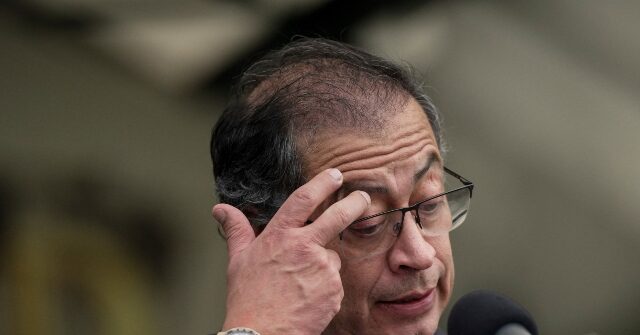Colombia’s far-left President Gustavo Petro on Friday morning called for Colombian migrants illegally in the United States to return to their country “as soon as possible.”
Petro – who recently asserted he would stop using Twitter (or “X”) and move to another social media platform after he caused a serious but short-lived diplomatic crisis via the site – used Twitter to issue the call for the return of illegal Colombian migrants, promising them financial aid through government social assistance programs.
“I request Colombians without documents in the U.S. to leave their jobs immediately and return to Colombia as soon as possible. Wealth is produced only by the working people,” Petro’s message read.
“The Department of Social Prosperity, DPS, will seek to provide productive credits to those returnees who enroll in its programs. Let’s build social wealth in Colombia,” he continued.
Minutes before he sent the message, Petro published a video criticizing the United States’ crackdown on illegal migrants, asserting that the Statue of Liberty “no longer shines” and that it is up to “American youth and workers to turn the light back on.”
Petro accompanied the message with a brief video published by Deutsche Welle (DW) reporting on the United States’ ongoing deportation of illegal migrants.
According to Colombian outlets, four deportation flights have arrived in Colombia as of Wednesday afternoon following Sunday’s diplomatic crisis with the United States, which Petro prompted with his abrupt refusal to allow one such previously agreed upon flight scheduled to arrive on that day.
Petro announced the abrupt change of policy on social media and justified his actions on the grounds that the United States treats Colombian migrants as “delinquents.” Petro demanded a protocol for the “dignified treatment” of deported migrants.
The Colombian newspaper El Tiempo reported on Thursday that the latest group of deportees arrived in Bogotá on a commercial plane handcuffed at the feet, hands, and waist. The restraints were removed upon landing in Colombian territory.
President Donald Trump responded to Petro’s abrupt refusal with a barrage of retaliatory measures that included a 25-percent tariff, a travel ban and visa sanctions on Colombian government officials, banking and financial sanctions, and the suspension of visa issuances at the U.S. Embassy in Bogotá starting on Monday, January 27, among other actions.
Petro rejected President Trump’s measures in a long, incoherent Twitter rant in which he accused Trump of being a racist while also inviting Trump, widely known for not drinking alcohol, to share a whiskey with him — despite Petro’s “gastritis.” Petro also threatened to respond to the tariffs by imposing a 50-percent tariff on the United States.
Hours after Petro’s bizarre statement, published in the early morning hours of Sunday, Colombian government officials announced that the nation had “agreed to all” of President Trump’s terms. According to reports from the New York Times and Colombia’s Noticias Caracol, the Colombian government urgently reached out to conservative former President Álvaro Uribe Vélez — a fierce opponent of Petro and his far-left government — to help defuse the diplomatic crisis by calling “his friends in Washington,” including Secretary of State Marco Rubio.
Petro, who was reportedly not present at the Colombian presidential palace on Sunday while his staff tried to find a solution to the crisis, refuted suspicions by Colombian journalists and politicians about his sobriety at the time of his message.
Although the tariffs, travel ban on government officials, and banking sanctions were ultimately not imposed after the Colombian government agreed to President Trump’s terms on Sunday evening, the suspension of visa issuance at the United States embassy in Bogotá remained in effect throughout the week.
Colombia’s Foreign Ministry announced on Thursday that the United States would resume visa issuance services at the embassy’s consular section on Friday, January 31.
“In this regard, we emphasize the mutual work to maintain diplomatic channels of dialogue between two States that are strategic partners in the hemisphere,” the Foreign Ministry’s statement read.
“The guarantee of rights, the national interest and the dignity of our citizens continues and will continue to be one of our priorities. Attention to the needs of our nationals inside and outside the country is one of the priorities of this government,” the statement concluded.
Christian K. Caruzo is a Venezuelan writer and documents life under socialism. You can follow him on Twitter here.
Read the full article here


